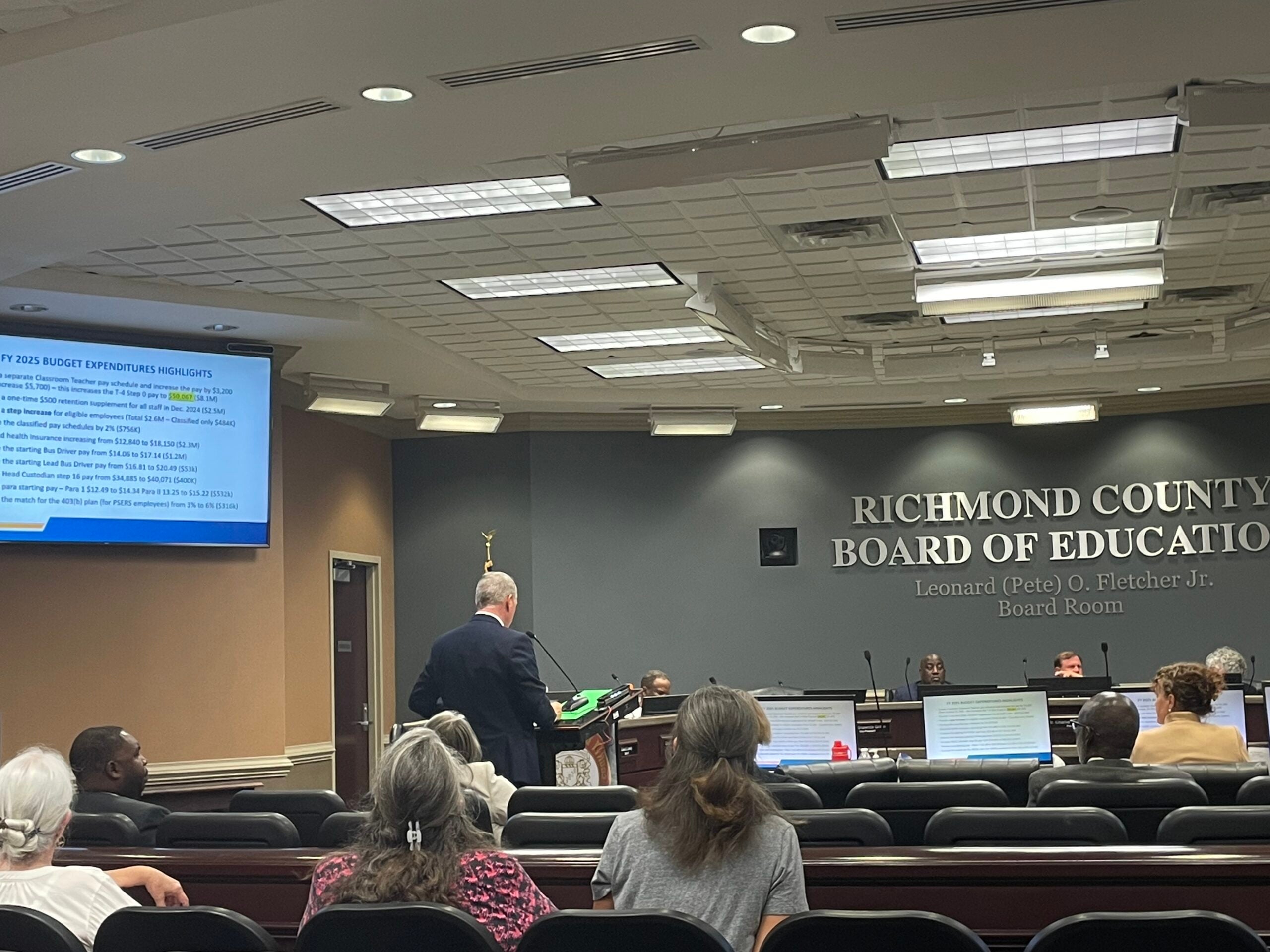The Richmond County Board of Education approved raising its millage rate to 18.33 mills for fiscal year 2025 in its final hearing, Tuesday evening, but not without hearing several residents speak in opposition to the increase.
School district CFO Bob Smith once again outlined the district finance department’s recommendation of the rate increase to recruit and retain faculty, increase pay for staff and provide retentions for teachers.
The district budget for this fiscal year is $56 million, Smith explained, 15% of which is kept in reserves to supplement operations from July—the beginning of the fiscal year, which concludes June of the following year—to October, when the district begins collecting property taxes.
MORE: Richmond County Board of Education holds two of three millage rate hearings
Smith also noted that $33.7 million worth of taxes are not collected, 70% of which is due to exemptions for homeowners over the age of 65 and for disabled veterans.
In responding to clarifying questions by school board president Charlie Walker, Smith observed that the last time the school board authorized raising teacher salaries was 2018, when board members approved a 2% increase, and that the state funded raises of $9,500 since then.
In this exchange, Walker and Smith also noted that the millage rate has been decreased in four of the last six years, and that special purpose local option sales taxes for education (ESPLOST) collected are to be allocated only toward capital projects, such as buildings or maintenance and repair, rather than for operations.
District 8 board member Jimmy Atkins confirmed with Smith that the tax exemption for Richmond County residents 65 or older was implemented some 30 years ago, saying, “This is the hand that we were dealt, that we cannot undo.”
MORE: Qualifying ends for RCBOE election, new names enter the race
Atkins also underscored that when he was first elected to the board, “starting teachers didn’t make $30,000 a year… Now, 20 years later, we’re $20,000 better with our starting pay.”
District 10 board member Helen Minchew asked Smith if freeport tax exemptions from school property taxes applied to manufacturers in the district, which Smith confirmed, stating that the exemption amounts to approximately $4 million.
District 4 board member Wayne Frazier offered comments challenging the budget, however, saying, “I think it’s a good budget as relates to giving teachers raises and giving our staff raises, but it’s a bad budget when we’re not educating children.”
Frazier emphasized the RCBOE’s responsibility toward students’ education, highlighting the district’s low education rankings.
“I would like to be able to look at business folks moving to Augusta and look them in the eye and say they’re moving to the best system in Georgia. I cannot, in good conscience, say that when I see what’s going on,” Frazier said. “When it comes to putting money out there, I don’t believe we should spend another dime on nothing until we make sure we can educate all of the children and get them all the resources they need in every school.”
MORE: Davidson Fine Arts band students to perform in Hawaii
Citizen comments on millage rate
After Smith’s presentation, and questions and comments from the board, 10 citizens came to speak in opposition of the rate increase during the meeting’s public speaking portion.
Betty Paschal posited the notion of a point system to track and assess the effectiveness of classroom teachers.
“There needs to be some accountability with our teachers,” she said. “Because while we do have good teachers in the system, we also have those that show up for a paycheck, and because of that, we need to hold them accountable.”
Mary Jane Abbott, a District 8 resident, asked the board if the budget’s retentions and salary increases were sustainable.
“If this is approved, next year and the year after and the year after, you’re not going to take the raise back,” she said. “So is this something in the foreseeable future that we can continue to meet the measure that you’ve set forward?”
Christy Caldwell would also stress accountability for faculty, particularly regarding the pay retentions, saying, “I work for corporate America, and I received a retention for covid, and that was over two years ago. Why are your teachers going to get a retention every single year for what if your school system is failing?”
After the initial called meeting was adjourned, the board reconvened several minutes later to formally adopt the new millage rate. All school board members, except Frazier, voted in favor.
Skyler Q. Andrews is a staff reporter covering business for The Augusta Press. Reach him at skyler@theaugustapress.com.











